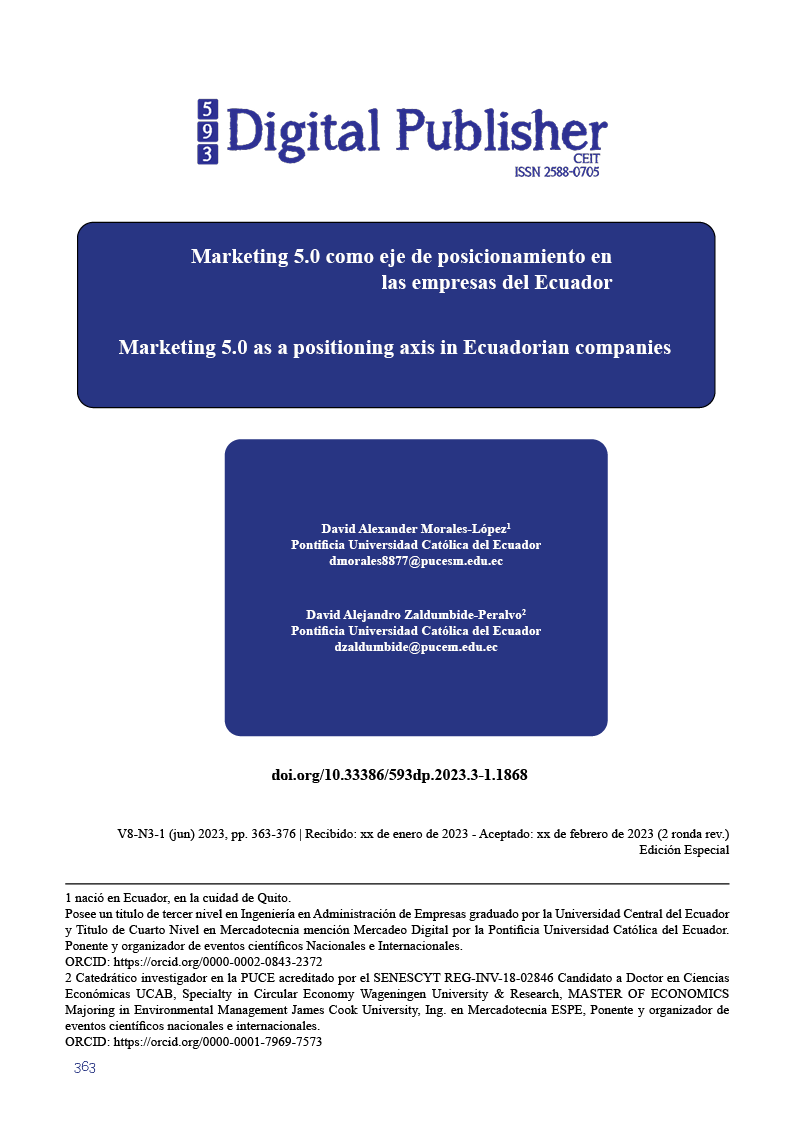Marketing 5.0 as the axis of positioning in companies in Ecuador
Main Article Content
Abstract
Technological development and new innovation trends have generated a challenge for companies to find their customers and consumers Given this, artificial intelligence and marketing 5.0 provides a frontier of possibilities for business strategy and achieve an adequate experience in their purchase, attention or loyalty processes. Understanding how machines and society adapt and complement each other is essential to generate a space for continuous learning and optimization of resources. Through the use of a mixed analysis, an interview was conducted using the Delphi method in order to know through professionals in the field of artificial intelligence and business digitalization how the business strategy is integrated and complemented with artificial intelligence (AI) tools, together a survey was applied to Ecuadorian companies that determined how AI and marketing 5.0 contribute within their development. Artificial intelligence in conjunction with marketing 5.0 contributes to the positioning of companies, because they integrate a wide range of tools and useful resources to predict, analyze and understand their customers, in the same way it allows the understanding of large groups of information to optimize resources and make decisions, within the main challenges that exist in Ecuador to implement technological tools goes hand in hand with the lack of Specialist professionals, the adaptability of society to these tools and the physical, economic and technological capacity of companies.
Downloads
Article Details

This work is licensed under a Creative Commons Attribution-NonCommercial-ShareAlike 4.0 International License.
1. Derechos de autor
Las obras que se publican en 593 Digital Publisher CEIT están sujetas a los siguientes términos:
1.1. 593 Digital Publisher CEIT, conserva los derechos patrimoniales (copyright) de las obras publicadas, favorece y permite la reutilización de las mismas bajo la licencia Licencia Creative Commons 4.0 de Reconocimiento-NoComercial-CompartirIgual 4.0, por lo cual se pueden copiar, usar, difundir, transmitir y exponer públicamente, siempre que:
1.1.a. Se cite la autoría y fuente original de su publicación (revista, editorial, URL).
1.1.b. No se usen para fines comerciales u onerosos.
1.1.c. Se mencione la existencia y especificaciones de esta licencia de uso.
References
Alonso Betanzos, A. (2023). La inteligencia artificial y la prospectiva. Dialnet. Obtenido de https://dialnet.unirioja.es/servlet/articulo?codigo=8789522
Atif, S. (2023). Analysing the alignment between circular economy and industry 4.0 nexus with industry 5.0 era: An integrative systematic literature review. wiley, 6. Obtenido de https://onlinelibrary.wiley.com/doi/full/10.1002/sd.2542
Buhalis, D., Leung, D., & Lin, M. (2023). Metaverse as a disruptive technology revolutionising tourism management and marketing. ELSEVIER, 5-6. doi:https://doi.org/10.1016/j.tourman.2023.104724
Cacheda Couto, J. (2022). Cómo mejorar la calidad de vida de los usuarios gracias al marketing 5.0. RUC, 55. Obtenido de https://ruc.udc.es/dspace/handle/2183/32123
Chen, C., Hu, X., & Fisher, J. (2023). The Conceptualization of “Presence” in Interactive Marketing: A Systematic Review of 30 Years of Literature. Springer. Obtenido de https://link.springer.com/chapter/10.1007/978-3-031-14961-0_18
Coronado Medina, A., Arias Pérez, J., & Perdomo Charry, G. (01 de Febrero de 2023). Efecto de la turbulencia tecnológica generada por la inteligencia artificial en la innovación de producto: el papel de la orientación estratégica a la digitalización. Revistas UN, 9. doi:https://doi.org/10.15446/innovar.v33n89.107036
Corral, M. M. (Marzo de 2020). Sociedad 5.0 y tecnologías emergentes al 2030. ACIS, 5. doi:https://doi.org/10.29236/sistemas.n154a1
EKOS. (2021). Ranking Empresarial. Revistas EKOS, 1-5. Obtenido de https://ekosnegocios.com/ranking-empresarial
Fernando, G. F. (30 de Junio de 2021). El marketing 5.0 y su efecto en la estrategia empresarial del sector industrial en España. RUC, 13. Obtenido de https://ruc.udc.es/dspace/handle/2183/30191
Ferrante, E. (2021). Inteligencia artificial y sesgos algorítmicos ¿Por qué deberían importarnos? BIBLAT, 7-11. Obtenido de https://biblat.unam.mx/es/revista/nueva-sociedad/articulo/inteligencia-artificial-y-sesgos-algoritmicos-por-que-deberian-importarnos
Ferreira Iensen, M. H. (2023). Educational Testbed in the Context of Industry 4.0 and 5.0: Literature Review. Springer, 2-4. Obtenido de https://link.springer.com/chapter/10.1007/978-3-031-23236-7_46
Fuciu , M., & Dumitrescu, L. (2018). From Marketing 1.0 To Marketing 4.0 – The Evolution of the Marketing Concept in the Context of the 21ST Century. Sciendo, 5-6. doi:https://doi.org/10.1515/kbo-2018-0064
García Contreras, J., & Mendoza Hernández, L. (2023). El impacto de la Industria y Sociedad 5.0 en la educación. Sapiens Boletín Científico De La Escuela Preparatoria, 9. Obtenido de https://repository.uaeh.edu.mx/revistas/index.php/prepa1/article/view/10387
García Plaza , M., & Rodero Pulido , M. M. (Enero de 2023). La función comercial: El marketing de la empresa. Universidad de Jaén, 2-3. Obtenido de https://tauja.ujaen.es/handle/10953.1/19367
Gómez, L. J., & Aversano, M. P. (2018). Marketing 2.0. Marketing en la web, marketing digital, maketing online. Centro de Estudios de Administración, 8. Obtenido de https://revistas.uns.edu.ar/cea/article/view/1348
H-UTokyo Lab. (2020). Society 5.0. Tokyo: Bunkyo-ku, Tokyo, Japan. Obtenido de https://link.springer.com/book/10.1007/978-981-15-2989-4
Jaramillo, R. C. (2023). MARKETING TECHNOLOGY STACK. Revista FAECO Sapiens, 5. Obtenido de https://revistas.up.ac.pa/index.php/faeco_sapiens/article/view/3398
Kotler, P., Kartajaya, H., & Setiawan, I. (2021). Marketing 5.0: Tecnología para la humanidad una entrevista con Hermawan Kartajaya e Iwan Setiawan. EL DIARIO DE MARKETING, 1-2. Obtenido de https://www.marketingjournal.org/marketing-5-0-technology-for-humanity-an-interview-with-hermawan-kartajaya-and-iwan-setiawan/
López, D. M. (Marzo de 2023). Revisión de impactos en la logística de ventas asociada al comercio electrónico: Propuestas de sostenibilidad. UNED, 20. Obtenido de http://e-spacio.uned.es/fez/view/bibliuned:master-CEE-SyRSC-Dmartinez
Lv, Z. (2023). Digital Twins in Industry 5.0. Research, 5. Obtenido de https://spj.science.org/doi/10.34133/research.0071
Martínez Ortega, A. G., & Medina Chicaiza, R. P. (2020). Tecnologías en la inteligencia artificial para el Marketing: una revisión de la literatura. Revista De Producción, Ciencias E Investigación, 38-40. doi:https://doi.org/10.29018/issn.2588-1000vol4iss30.2020pp36-47
Morales López, D. A. (2020). Teletrabajo como estrategia de competitividad y desarrollo para las empresas en el Ecuador. Eruditus, 3-5. doi:https://doi.org/10.35290/re.v1n2.2020.318
Muñoz Leiva, F., Hernández Méndez, J., & Gómez Carmona, D. (2019). Measuring advertising effectiveness in Travel 2.0 websites through eye-tracking technology. ELSERVIER, 3. Obtenido de https://www.sciencedirect.com/science/article/abs/pii/S0031938418301239
Ortega , A. (Abril de 2019). Sociedad 5.0: el concepto japonés para una sociedad. Elcano, 5-6. Obtenido de https://media.realinstitutoelcano.org/wp-content/uploads/2021/11/ari10-2019-ortega-sociedad-5-0-concepto-japones-sociedad-superinteligente.pdf
Pérez, J. C. (2018). La Historia y Evolución del Marketing; Hacia un Marketing Digital Influyente Para Las Organizaciones en el Siglo XXI. Fundación Universitaria de Popayán, 50-60. Obtenido de http://unividafup.edu.co/repositorio/files/original/1fe9c271022b9d14317bc8c41740d1d6.pdf
Quispe, A., Alvarez Valdivia, M. G., & Guevara, S. L. (2020). Metodologías Cuantitativas 2: Sesgo de confusión y cómo controlar un confusor. Scielo, 5-10. Obtenido de http://www.scielo.org.pe/scielo.php?pid=S2227-47312020000200016&script=sci_arttext
Rojas, M. L. (25 de Enero de 2023). Pensamiento de diseño y marcos éticos para la Inteligencia Artificial: una mirada a la participación de las múltiples partes interesadas. urosario, 5-7. Obtenido de https://revistas.urosario.edu.co/index.php/desafios/article/view/12183
Santos da Silva, N., & Almeida Silva, A. (2023). UMA REVISÃO SISTEMÁTICA DA LITERATURA SOBRE TECNOLOGIAS DIGITAIS DA INFORMAÇÃO E COMUNICAÇÃO NO MARKETING. FOCO. doi:https://doi.org/10.54751/revistafoco.v16n3-066
Tramullas, J. (2020). Temas y métodos de investigación en Ciencia de la Información, 2000-2019. Revisión bibliográfica. Profesional de la información, 3-7. doi:https://doi.org/10.3145/epi.2020.jul.17
Vaidya, R. (2023). CONCEPTUALIZING INFLUENCER MARKETING: A LITERATURE REVIEW ON THE STRATEGIC USE OF SOCIAL MEDIA INFLUENCERS. IJMPR, 7. doi:https://doi.org/10.55829/ijmpr.v2iSpecialIssue.140



